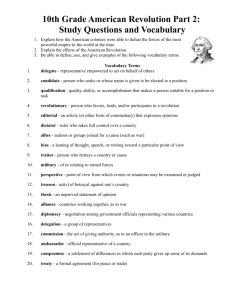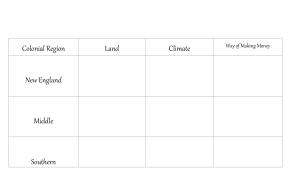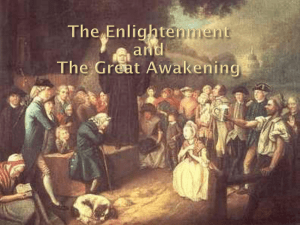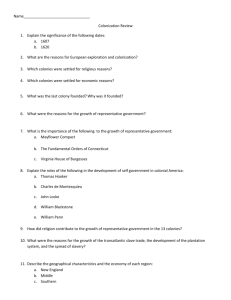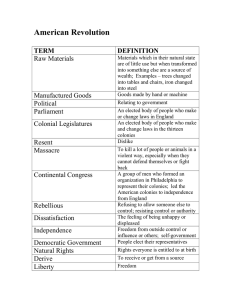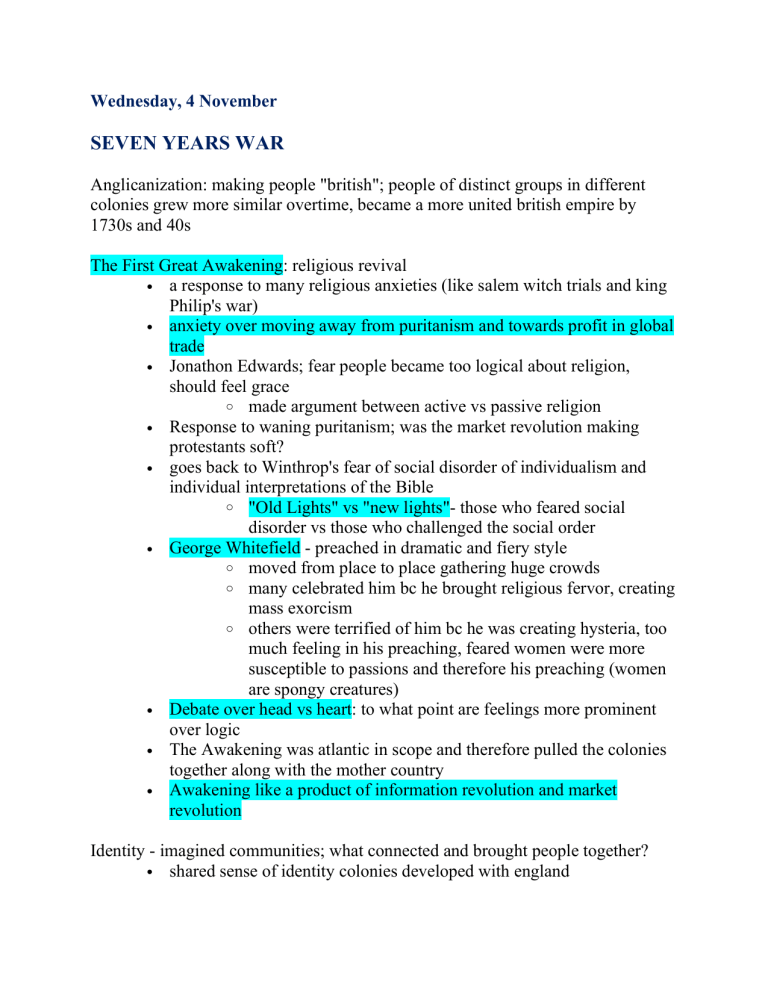
Wednesday, 4 November SEVEN YEARS WAR Anglicanization: making people "british"; people of distinct groups in different colonies grew more similar overtime, became a more united british empire by 1730s and 40s The First Great Awakening: religious revival a response to many religious anxieties (like salem witch trials and king Philip's war) anxiety over moving away from puritanism and towards profit in global trade Jonathon Edwards; fear people became too logical about religion, should feel grace o made argument between active vs passive religion Response to waning puritanism; was the market revolution making protestants soft? goes back to Winthrop's fear of social disorder of individualism and individual interpretations of the Bible o "Old Lights" vs "new lights"- those who feared social disorder vs those who challenged the social order George Whitefield - preached in dramatic and fiery style o moved from place to place gathering huge crowds o many celebrated him bc he brought religious fervor, creating mass exorcism o others were terrified of him bc he was creating hysteria, too much feeling in his preaching, feared women were more susceptible to passions and therefore his preaching (women are spongy creatures) Debate over head vs heart: to what point are feelings more prominent over logic The Awakening was atlantic in scope and therefore pulled the colonies together along with the mother country Awakening like a product of information revolution and market revolution Identity - imagined communities; what connected and brought people together? shared sense of identity colonies developed with england nations are imagined communities; people are willing to die for an abstract community of people they've never met Teleology: eventually colonies will become the US, but must imagine the events of history independently, like we don't know the outcome important as we read Ben Franklin's autobiography He read a lot, worked in newspapers and wrote in them Franklin was runaway from his older brother; went to philadelphia and started a newspaper; contributed to anglicization autobiography broken into three sections: first part written before the american revolution, written to his son (who later stayed a loyalist); second part written during american revolution franklin was a really proud member of the british empire early on, was gentry figure, very wealthy; became famous for science was sent to France to convince them to aide in war; changed his identity and dressed like a quaker, living in the wilderness, make himself look more like a philosophical intellectual who rejects luxury (wrote his second part of his autobiography at this point, re-remembering himself and crafting his image) Seven Years War - culmination of "Creole" Imperialist ambitions aka french and indian war, the late french war, the war of conquest we forget how important the seven years war was bc of teleology global war - involved india, africa, europe, north and south america, and parts of asia; considered first "world war" fought primarily by three factions o the iroquois nations -- made of five nations; britain; france French Canada: massive catholic empire based in trade versus english protestant colonies based in settlement middle of 18th century british population was 20 times larger than french The Walking Purchase (1737) - iroquois sold massive amount of land when it didn't belong to them Imperialist expansionist ambitions of colonists included George Washington, a young land speculator at the time, an obssessive planter -- fantasized moving west Benjamin Franklin proposed a plan for the union of all colonies under one government, for purposes of defense england rejected it for being too democratic if the union was formed, colonies may have been strong enough to defend themselves; thus no need for english troops; thus no basis for the english taxation Britain decides to escalate the Seven Years War 1755, britain sent unprecedented number of troops to fight the war General Edward Braddock sent to avenge Washington's failure o kind of an idiot; didn't know how to fight in wilderness, didn't take indians seriously as warriors Washington takes command and redeems himself by saving half his troops by retreating o became master of retreat, which becomes important in the American revolution initial setbacks in the war were costly; Prime Minister William Pitt put a lot of money in the war in America; france wasn't able to do the same, france was more concerned with european affairs Death of General Wolfe -- became a matyr on the Plains of Abraham War changed everything for the British empire now had more territory than ever before spent a ton of money on the war -- 10 times more than french spent to defend it huge numbers of people moving westward; devastating for Indians such a big war, George III thought he could not control all this territory -- and made the Proclamation of 1763 where colonists could not expand westward past the Appalachians o proclamation made people like George Washington furious

